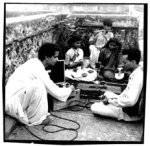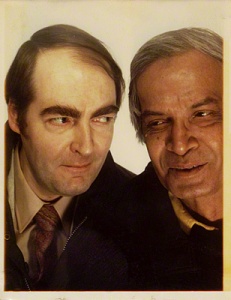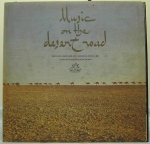Deben Bhattacharya
Deben Bhattacharya (1921 – 2001)
Here’s an account of Deben Bhattacharya’s early career by the man himself. I found it on the web and now for the life of me can’t find the link to credit it. It seems to have disappeared from the web too. If it was on your site, let me know.
 It started in November 1953 at London’s West End on a shop floor which had tape editing facilities in the basement. I was looking for a portable tape-recorder to carry with me during my forthcoming visit to India. My purpose was to make field recordings of village music as well as of the classical Ragas at their sources in the homes of the Masters to illustrate my radio programs for the BBC and other radio stations in Europe. Even after two centuries of contact between Britain and India, very few people in the U.K. or in Europe had any knowledge of Indian music in the early fifties.
It started in November 1953 at London’s West End on a shop floor which had tape editing facilities in the basement. I was looking for a portable tape-recorder to carry with me during my forthcoming visit to India. My purpose was to make field recordings of village music as well as of the classical Ragas at their sources in the homes of the Masters to illustrate my radio programs for the BBC and other radio stations in Europe. Even after two centuries of contact between Britain and India, very few people in the U.K. or in Europe had any knowledge of Indian music in the early fifties.
Therefore I wanted to collect what I thought would be the best examples for illustrating my talks. In those days, I was dependent on commercially produced 78 r.p.m. Records which were totally inadequate for the purpose. In India, LP records were practically unknown at that time.
One day a helpful musician friend in London drove me to meet Harley Usill of Argo Records on George Street. Harley had already made important contributions to the field of spoken words, poetry and drama, and my friend thought that he might be interested in ‘ethnic’ music as today’s traditional music was called at the time.
(In an interview with Kevin Daly, Bhattacharya said it was Monica Pidgeon, then editor of Architectural Design, who introduced him to Usill. Pidgeon was the sister of artist Olga Lehmann, who designed album covers for Argo in the mid-fifties)
When I met him, little did I know the role Harley was going to play in my new professional life as a collector-producer of traditional music. As long as Harley controlled Argo Records, even after the company was officially taken over by Decca in 1957, Decca left him free to continue in his own way. But alas, Harley died at the age of 66 in 1991, a few years after Decca was taken over by Polygram.
Harley helped me to buy my very first tape-recorder, the British-made ‘GB Paul Kelee’. It was semi-professional equipment; portable but heavy. As I set out for my first recording journey to India toward the end of 1953, my one-man mobile unit consisted of a 12 volt car battery without the car and a vibrator for power supply in the villages in addition to the tape-recorder and other accessories. I returned with about ten hours of music after my recording expedition to India and Harley and I spent hours selecting material for the first two LP records in my Series.
(In the picture: Deben Bhattacharya with great friend and fellow Argo stalwart producer Kevin Daly – taken probably at a photo booth at St Lazare, thanks to Kevin’s son Michael for the pic)
Thanks to Harley, while Argo Decca provided me with a steady platform for presenting my collection of traditional music from East and West, I had to struggle hard to find funds for continuing with the work. Royalties from the sales of my records did not cover even a fraction of the total cost of traveling and collecting music. While recording in the Indian villages I discovered that it was not a work which could be accomplished in a hurry. I needed time to get to know the people, their social habits and customs even in my own country which I knew reasonably well.
In parts of India, I even needed an interpreter to communicate with the villagers and to get the meaning of the words of a song. Right from the start of my work as a collector, I had decided to record music in its proper milieu a harvest song must be recorded in the open field, a wedding song in the house of celebrations, religious music in a place of worship. Reaching my location, my first quest therefore was to look for a local contact who could speak English or French. In each country, even in a small village, it was the school which came to my rescue, sometimes the students, other times the teachers.
In order to find funds to continue with this work, I made documentary films on Asian Performing Arts, translated books of Indian medieval poetry for UNESCO’s East-West Major works Series, produced radio programs for the BBC and concerts of traditional music from Asia and Eastern Europe for schools and universities in Sweden under the sponsorship of the Rikskonserter the Swedish state music educational institute.
 Furthermore, with my collection from nearly forty countries of Europe, Asia and North Africa, I was able to produce records for any record company that was interested. In 1955, for instance, I made my first overland journey by car to retrace the gypsy route in reverse, from Europe to India, through the countries of West Asia. It took me over six months and was financed by EMI. The immediate outcome was an LP entitled “Music on the Desert Road,” released by Angel Records in USA in 1956.
Furthermore, with my collection from nearly forty countries of Europe, Asia and North Africa, I was able to produce records for any record company that was interested. In 1955, for instance, I made my first overland journey by car to retrace the gypsy route in reverse, from Europe to India, through the countries of West Asia. It took me over six months and was financed by EMI. The immediate outcome was an LP entitled “Music on the Desert Road,” released by Angel Records in USA in 1956.
Neither a musician nor an educator, I record and collect unwritten music primarily for my own pleasure but also to share it with those who are not fortunate enough to have had the opportunity to hear it directly from the mouth of a Bedouin singer in the caravan, sadly enough, all too rare these days. An ancient Sanskrit scholar defines music as the root of joy, for me that joy becomes even more meaningful when shared with others.
(There’s an excellent 5-part interview with Deben Bhattacharya on the website devoted to Decca/Argo/ASV producer Kevin Daly. Click here)
I’ve made a start on a vinyl discography of Deben Bhattacharya. Contributions needed. It’s here.
(more about Deben Bhattacharya as and when)



I have a copy of “the gypsies” a book and two 33 1/3 rpm records by deben, but can’t find it in the discography. anyone know anything about it? cheers keziah
Hi Keziah, is that the 1966 one with the two 7″ records in the sleeves? Have you got any photos of any of it? cheers
Sorry I have only just picked up your message having “lost” the site address. Yes I do have photos of it can you email me your address and I will send you photos of the records and book Keziah,
Hi folkcatalogue – I would like to communicate with you via email if possible – I have a couple of Argo LPs which you might want to include
Cheers
T
cheers. done.
Thrilled to find this info on my brother Deben. The B&W photo on top was taken on roof of our family home in Benaras, in 1954. Deben is recoding in squatting position and different members of the family displaying different instruments while the sound is being recorded as they played. i believe the photographer was Richard Lannoy, who accompanied him during the recordings of the Bauls of Bengal.
I don’t know if it is too late to respond to this comment of Asim Bhattacharya, but I am writing on behalf of The Travelling Archive (www.thetravellingarchive.org) which is a field research/recording project on the folk music of Bengal. We are very keen to know more about Deben Bhattacharya (I met him and his wife Jharna briefly once in 2000–i think–when Bangladeshi filmmaker Tareque Masud had sent me to their Southern Avenue flat in Calcutta, but I had not started my research then and so the questions I want to ask now had not yet formed). It would be so good to connect with the family and know where it all began, especially as Deben babu was such a great pioneer of ethnomusicological field recording in Bengal.
[…] The excerpt of the liturgy featured here was recorded by famous Bangladeshi ethnomusicologist Deben Bhattacharya, who also featured segments of the Coptic liturgy on his great Religions of the Middle East […]
Coptic Chants | Record Plethora said this on January 8, 2014 at 3:53 am |